The Double (2013)
Directed by: Richard Ayoade
Written by: Avi Korine, Fyodor Dostoevsky, Richard Ayoade
Starring: Jesse Eisenberg, Mia Wasikowska, Noah Taylor, Wallace Shawn
UK
AVAILABLE ON DVD AND BLU-RAY: Now
RUNNING TIME: 94 min
REVIEWED BY: Dr Lenera, Official HCF Critic
Simon James is a timid and shy young man who’s been working at a government agency for seven years. He always tries to please those around him but seems to live his life unperceived by everyone else. He’s in love with one of his co-workers, Hannah, and always looks for an excuse to visit her at the printing room, but is too shy to speak to her let alone ask her out, and resorts to watch her through a telescope from his apartment. Simon’s life turns around when one day his boss, Mr. Papadopoulos, introduces a new co-worker named James who is physically identical to him, but with a complete opposite personality….
For some reason I never got to see The Double at the cinema, even though it came to one of my two locals. I think it was one of those weeks when there were three films I wanted to see and one had to go. I really wish I had seen it at the pictures though, because then I would have been able to rave about how good it is a lot earlier. The Double is the sort of film that isn’t done too much at the moment, a singular artistic vision boldly realised on-screen that doesn’t compromise and isn’t really like much else out there. Director Richard Ayoade [the man who was the only person on The Watch who seemed to be enjoying himself], whose Submarine I haven’t seen but will now do so as quickly as possible, shows the influence of many films from Brazil to The Tenant to Fight Club, and I even detected certain similarities to The Man Who Haunted Himself, the much underrated Roger Moore-starrer I actually reviewed for this very website quite a while ago, but then again the theme of the ‘double’ or ‘doppleganger’ is an oft-used one [my favourite version is Edgar Allan Poe’s], partly because it’s rife with psychological and philosophical aspects.
In fact The Double was almost made in 1996 by Roman Polanski [starring John Travolta!] but I really don’t think he would have done as good a job as Ayoade, a bold thing to say I know. His film isn’t very faithful to Fyodor Dosteovsky’s novella, but then again that writer’s a hard one to adapt for the screen, and the book is as much a critique of Russian society of the time as an individual journey, a path which Ayoade and co-writer Avi Korine rightfully decided not to go down. In fact the setting of their film is intriguingly odd and vague. We seem to be in the 70’s, perhaps in Russia of the time, but could also be in the 40’s, though much of the strange pre-digital technology in the film never actually existed. You never properly see daylight, enhancing the stifling feel and even providing a touch of old film noir, while the restricted settings – we’re seemingly confined to one small area – while maybe necessitated by the budget, actually work really well considering nearly everything is shown from Simon’s point of view. The world of this film, small though it might be, and clearly showing inspiration from Franz Kafka, Terry Gilliam and even David Lynch, has been totally thought through up to the tiniest detail and remains wonderfully alien, yet wonderfully real too. It’s a bit fantastical, yet it’s a world we probably all feel we’ve lived in to some degree.
We’ve certainly all felt like we’ve been like Simon at some point. He’s a nobody who is constantly ignored and belittled. He’s introduced sitting on a train when somebody, his face unseen, comes over to him and says: “You’re in my seat”. Simon meekly surrenders his place and stays standing up despite there easily being enough room for both of them. He gets his briefcase stuck in the door whilst leaving the train, probably because he’s more interested in a girl he sees [I’m sure us men have all been there], and thereafter has to sign in without his proper I.D.badge. He has ideas but his boss just ignores him. He can’t even exit a lift without the doors opening and shutting for ages. His own mother keeps putting him down. He’s so isolated from society that, even when he’s spying through a key hole into a party and at a girl [the same one, and called Hannah], when people open the door, they walk straight past him and don’t even notice that he’s there. Eventually, he’s even told that he doesn’t legally exist. The casting of Jesse Eisenberg is especially astute considering he played Mark Zuckerberg who created Facebook, the ultimate in pretending to connect people but actually stopping people from being intimate.
Of course, and perhaps most important of all, there’s also the fact that when a new staff member shows up who looks just like him, nobody seems to notice because, perhaps, Simon is so insignificant. The film takes its time building up to the appearance of James, who then turns out to be everything Simon is not. He’s confident, charismatic, liked by the boss who immediately uses some of his ideas and promotes him, and successful with women. He doesn’t just seduce the boss’s daughter whom Simon was asked to tutor, but also eases his way into Hannah’s bed with James Bondian speed. There are some scenes of a romantic comedy feel when the two doubles swap places and Hannah doesn’t realise, and a sense that the film is stalling ever so slightly before doing the complete opposite and rushing through the plot in the final third so quickly that not every occurrence is given enough weight. The ending is perplexing, but in a good way. You just have to decide for yourself, as with quite a few elements of the film. A good example is Hannah. I felt I never really got to know her or her agenda, and this seemed entirely intentional rather than poor writing. This is one of those films where you need to fill in the blanks for yourself, and there may be several different ways of doing so.
Erik Wilson’s cinematography works wonders with what is mostly a deliberately restricted palate. He uses mostly browns and yellows, but every now and again does something strikingly different, like bathing the lobby outside Hannah’s apartment in patterns of blue and green, or having Simon walk down a hallway which turns alternately red, yellow and blue. The whole look of this film is amazing and along with some very Eraserhead-style sound effects helps give it a unique atmosphere. Strange, uncanny details abound, like Simon’s workspace having a really low door frame but no actual door, or a dove behind a glass door which later seems to turn into a bird’s nest. Perhaps this stuff means something, perhaps it doesn’t, but it means that there’s always something to ponder. Meanwhile Jesse Eisenberg is never less than superb as he differentiates the two doubles and always lets us know which one we’re watching without any kind of make-up or exaggeration. When the two are together the effect is totally seamless. Mia Wasikowska plays Hannah very cleverly by hinting at things about the character rather than spelling them out. Ayoade finds good little parts for The It Crowd alumni Chris Morris and Chris O’Dowd, and it seems that much of the cast of Submarine is in in there too.
I was pretty impressed with The Double. The second half doesn’t quite fulfil the promise of the first and would have benefitted from being allowed to play out at greater length, but you can’t really say it goes off the rails. It’s just not at as high a level as what came before. Ayoade shows he is an impressive directorial talent and he’s created quite a unique picture here. He adeptly balances all the elements of his film, from nightmare comedy to social satire to twisted love story, while maintaining a very particular style and outlook, and ensures that the film never loses what it’s really about: how desperately some of us have to fight for societal acceptance, and how that fight can so easily make things worse, rather than better.
Rating: 









SPECIAL FEATURES
* Making of
* Deleted Scenes
* Extended Scenes

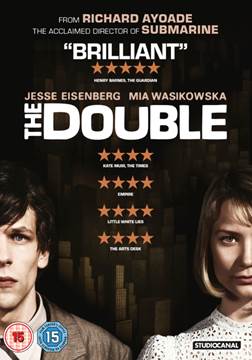
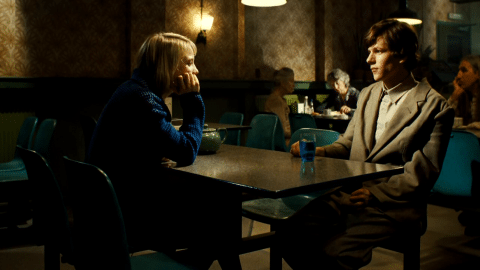
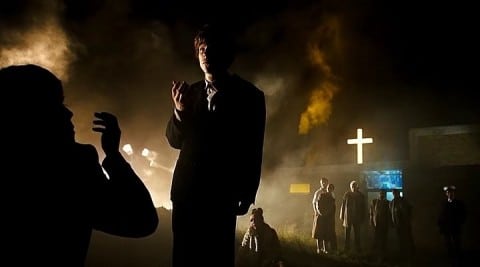


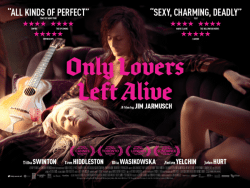
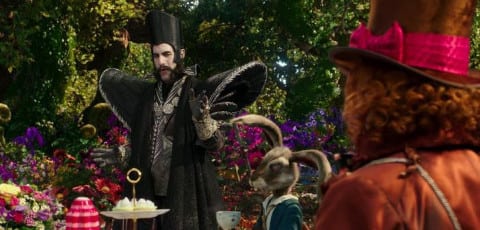
Be the first to comment